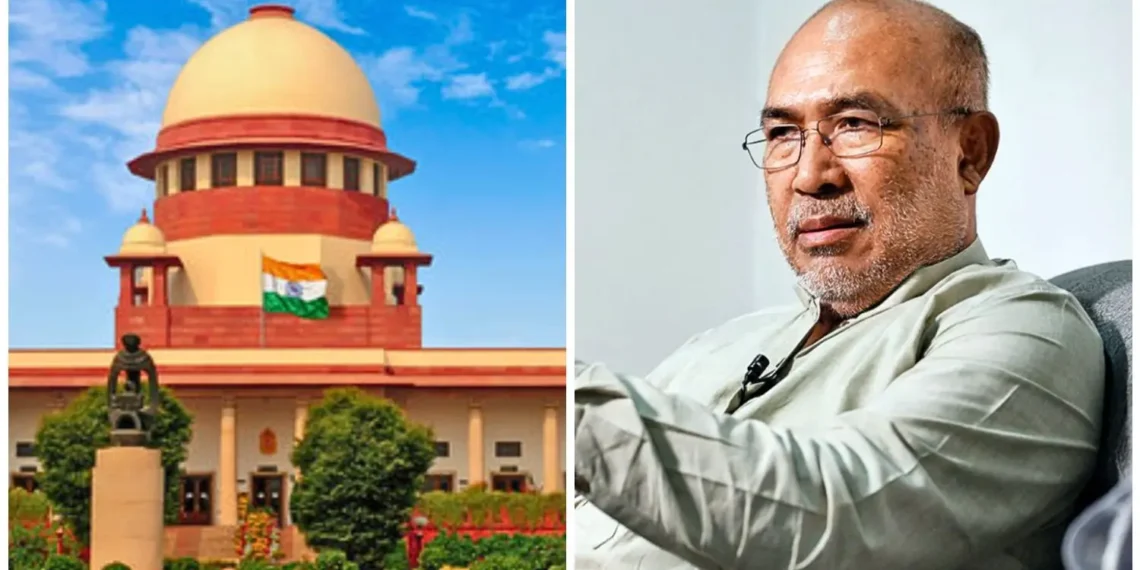KOHUR Tells Supreme Court Manipur Police Sent Only Four ‘Cut-Out’ Clips Instead of Full 48-Minute Audio in Biren Tape Probe.
BY NAVIN UPADHYAY
New Delhi, November 20: The controversy over the leaked audio tapes purportedly involving former Manipur Chief Minister N. Biren Singh took a sharp turn on Thursday, with the Kuki Organisation for Human Rights Trust (KOHUR) alleging before the Supreme Court that the Manipur Police forwarded only four short “cut-out” clips to forensic authorities instead of the complete 48-minute-46-second recording originally placed on record.
KOHUR has described this as a “shocking lapse” that raises serious doubts about the integrity and intention behind the state-led probe.
In a fresh affidavit, KOHUR Chairman Benjamin Mate detailed how the whistleblower’s long-form recording was first submitted to a commission of inquiry and later brought before the Supreme Court along with an independent forensic report. The four affidavits filed by the organisation trace the full chain of custody of the audio file, the involvement of multiple forensic institutions, and what it calls a pattern of procedural failures by state agencies.
According to the affidavit, the “shocking revelation” concerns the conduct of the Office of the Superintendent of Police, Cyber Crime, Manipur. Although the Supreme Court had mandated that forensic authorities be given all relevant material—including the disputed audio and the admitted voice samples—the police allegedly transmitted only four short extracts of approximately 30 seconds, 1 minute 28 seconds, 36 seconds and 1 minute 47 seconds. All four clips were taken from the longer, continuous recording.
KOHUR argues that by forwarding only these fragments, the Manipur Police denied forensic experts the ability to examine the continuity, internal integrity and potential tampering of the original file. This “selective forwarding”, the group says, effectively prevented a comprehensive authenticity analysis and resulted in the Supreme Court being presented with an “incomplete and misleading picture” of the evidence.
The rights group has also asked the court to note the contradictions among the findings of the Central Forensic Science Laboratory (CFSL), and the National Forensic Science University (NFSU), Gandhinagar. The affidavit recounts that after the petitioners submitted the full audio and the Truth Labs report, the Manipur government told the court it had sent “audio clips” to CFSL—but never clarified what was actually forwarded. When CFSL’s first report was opened in court on 5 May 2025, the bench found it unsatisfactory and ordered a fresh report. But the CFSL failed to give a clear opinion on whether the questioned voice matched the admitted one, prompting the court to seek the lab’s full questionnaire.
It was against this backdrop that the Supreme Court, on 25 August 2025, handed the matter to NFSU with a dual mandate: to determine whether the disputed audio had been edited or tampered with, and to provide a clear and conclusive voice comparison between the questioned audio and the admitted voice of Biren Singh. The court directed that the necessary files be sent within a week—a directive that KOHUR says created a clear presumption that the full 48-minute-46-second recording would be included.
READ: COCOMI Condemn ‘Brutal’ Police Action During Anti-Sangai Protest
READ: Bhagwat to Reach Out to Both Tribal, Meitei Leaders in Manipur
Instead, the police forwarded only the four cut-out clips. As a result, NFSU limited its examination to metadata and file structure and concluded that the questioned clips (labelled Y1–Y4) bore signs of modification, editing and tampering, rendering them unsuitable for voice comparison. The university also examined three broadcast masters (A1–A3) supplied by Doordarshan as admitted voice samples but found these too to be processed, containing annotations, graphics and continuity breaks, and concluded they were not original source files suitable for comparison.
By contrast, KOHUR’s affidavit highlights that Truth Labs—an independent forensic agency—had been provided the complete 48-minute-46-second continuous recording along with multiple speech samples of Biren Singh. Using auditory, acoustic, spectrographic and statistical tests, including Chi Square and likelihood ratio modelling, Truth Labs reportedly found a 93% probability that the questioned voice matched the former Chief Minister’s admitted voice. It also verified the internal continuity of the long recording and found no unnatural breaks.
KOHUR argues that the Truth Labs findings reflect “far greater scientific diligence” and that the discrepancy between Truth Labs’ conclusion and NFSU’s inability to perform a voice match is a direct consequence of the state’s decision to send only four truncated clips.
On the basis of these contradictions, the petitioners have asked the Supreme Court to direct the State to explain who authorised the truncation of the audio file, why the complete recording was never subjected to forensic scrutiny by state-linked agencies, and why CFSL, FSL Guwahati and NFSU all failed to produce a clear voice match despite the availability of a long-form continuous recording.
The affidavit reiterates KOHUR’s demand for a court-monitored Special Investigation Team (SIT), arguing that the latest disclosures show that “an impartial and credible investigation cannot be entrusted to the state machinery alone”. The organisation contends that inconclusive or methodologically weak forensic reports cannot be used to stifle a criminal investigation at the threshold when more complete and scientifically robust evidence exists.














